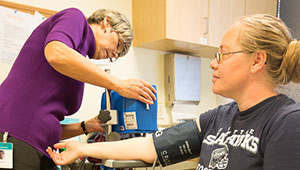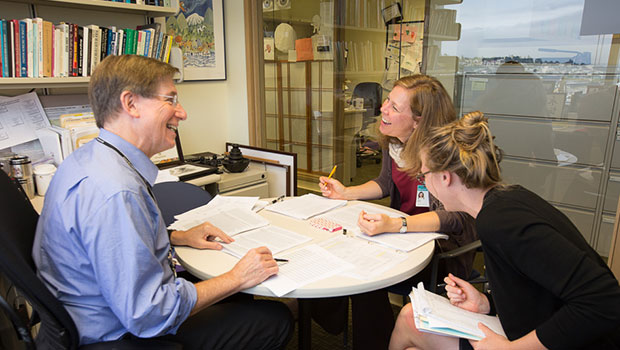Our Impact
Results that matter to you, your family, your world
How many people have benefited from 40 years of findings from Kaiser Permanente Washington Health Research Institute (KPWHRI)? That’s hard to say because much of our research helps people avoid health problems. So you won’t find them in doctors’ offices and hospitals. You’ll find them instead at work and at play, unencumbered by serious illness and injury.
But we do know that discoveries from Kaiser Permanente Washington research have changed the way people around the world care for their own health and how health care providers care for their patients.
Here are just a few examples:
Making sure COVID-19 vaccines are safe and effective
Our Vaccine and Treatment Evaluation Unit launched the world’s first COVID-19 vaccine trial in March 2020. By mid-December of that year, their quick work and subsequent participation in a phase 3 trial helped lead the U.S. Food and Drug Administration (FDA) to approve that vaccine — the NIH-Moderna vaccine — for broad distribution.
KPWHRI continues to be at the forefront of efforts to understand, prevent, diagnose, and treat COVID-19 with our ongoing research on vaccines, medications, forecasts, and the impact of the virus on various health conditions. We have also published important work illuminating factors contributing to racial and ethnic disparities in COVID-19 outcomes.
Preventing traumatic brain injury
Our early research showed that bicycle helmets reduce head injuries. Within a year, bicycle helmet use accelerated nationwide. We later found that a bike helmet campaign is cost effective, increases use of helmets, and reduces hospital admissions for head injuries.
Breaking a deadly habit
The phone-based smoking cessation program Kaiser Permanente Washington developed and tested has helped millions across the country to quit tobacco. Behavioral health research in the Kaiser Permanente Washington population established the effectiveness of telephone and web-based counseling to help people quit smoking, a model now used nationwide.
Stopping cancer in its tracks
Research on Kaiser Permanente Washington's risk-based breast cancer screening program — the first of its kind — has set standards and improved the quality and effectiveness of mammography over decades.
A KPWHRI study on home colon cancer screening led to a new program throughout all Kaiser Permanente Washington clinics that can help find and treat colon cancer early. And KPWHRI researchers are leading work that could help more people get timely screening for cervical cancer, which is highly preventable if precancers are identified through screening.
Work continues as we seek to identify the best technologies and approaches for finding and treating breast, colorectal, cervical, lung, and other cancers.
Overcoming chronic low back pain
Kaiser Permanente Washington studies of complementary and alternative approaches have influenced national guidelines for treating chronic low back pain. Massage, yoga, and acupuncture are now recognized as sound, low-tech, and relatively inexpensive approaches to this very common health problem.
Getting the care you need
The Chronic Care Model, pioneered and disseminated by KPWHRI’s Center for Accelerating Care Transformation (ACT Center), is now used by thousands of health care systems worldwide to guide quality improvement efforts for diabetes, asthma, heart disease, and other chronic conditions.
Kaiser Permanente Washington research also proved the power of the patient-centered medical home — a way to coordinate and streamline care in primary care settings. In our studies, the strategy yielded cost savings, lowered death rates, and improved patient outcomes.
Our studies of a model of collaborative care for depression showed that combining psychiatric and primary care results in better patient outcomes and lower costs. Later research showed that effective depression care for patients who also have other chronic conditions such as diabetes and heart disease — an approach called TEAMcare — achieves similar results.
And our BP-CHECK study found that blood pressure readings taken at home were the most accurate and preferred method for diagnosing hypertension, compared with blood pressures taken in clinic or at blood pressure kiosks. A new pilot program at Kaiser Permanente Washington, in partnership with our researchers, is now looking at the outcomes of making home monitoring an option for more patients.
Avoiding the harms of overtreatment
Kaiser Permanente Washington research identified the risks of overprescribing prescription opioids (drugs like Vicodin and Oxycontin) for chronic noncancer pain. KPWHRI continues to take the lead in helping patients find safe, effective ways to manage chronic pain and improve care for opioid use disorders.
KPWHRI also evaluated the strength of Kaiser Permanente Washington's initiative to improve prescribing safety, proving the effectiveness of standardizing practices through new clinical guidelines and safer monitoring.
Kaiser Permanente Washington scientists also participated in research that revealed increasing harm of overusing high-end imaging such as computed tomography. And they evaluated the effectiveness of Kaiser Permanente Washington's initiative to improve safety by reducing patient radiation doses.
Taking charge of your care — based on your values
Shared decision-making helps people understand the value of their care and make the decisions that are right for them — so they don’t get more or less care than they need. In studying this approach, Kaiser Permanente Washington has been a leader and innovator in delivering decision aids to patients. And our research has shown that Kaiser Permanente Washington's use of video-based decision aids for hip and knee surgery is linked to reduced surgery rates and costs.
Staying sharp as you age
Kaiser Permanente Washington research has shown that older adults who exercise regularly can delay or prevent the onset of dementia. They also have fewer falls and use the health care system less, resulting in lower costs.
Be part of a study

Participants are a critical partner for KPWHRI's work
KPWHRI recruits Kaiser Permanente Washington members and others to participate in studies that help us evaluate innovative ways to diagnose, treat, and prevent disease—all key to our mission of improving health and health care for everyone.
Scientists

Our scientists
Kaiser Permanente Washington Health Research Institute's scientific inquiry is led by our faculty of investigators, research associates, and biostatisticians.




